A long-tail keyword is long and consists of multiple words. Thus the reference “long tail”.
Here are two examples:
- Long-tail keyword: Hockey Sticks for Right-Handed Juniors
- Short-tail keyword: Hockey Sticks
Long-tail keywords are usually less competitive than short ones.
This is why many bloggers and SEOs build their content strategy to initially focus on covering “long-tail topics” to build an audience quicker.
Let’s take a closer look!
What Is a Long-Tail Keyword?
Long-tail keywords are specific and longer phrases that are highly relevant to a particular topic.
They typically consist of three or more words.
For example, a short-tail general keyword might be “shoes”.

A long-tail keyword could be “women’s waterproof hiking shoes size 7.”
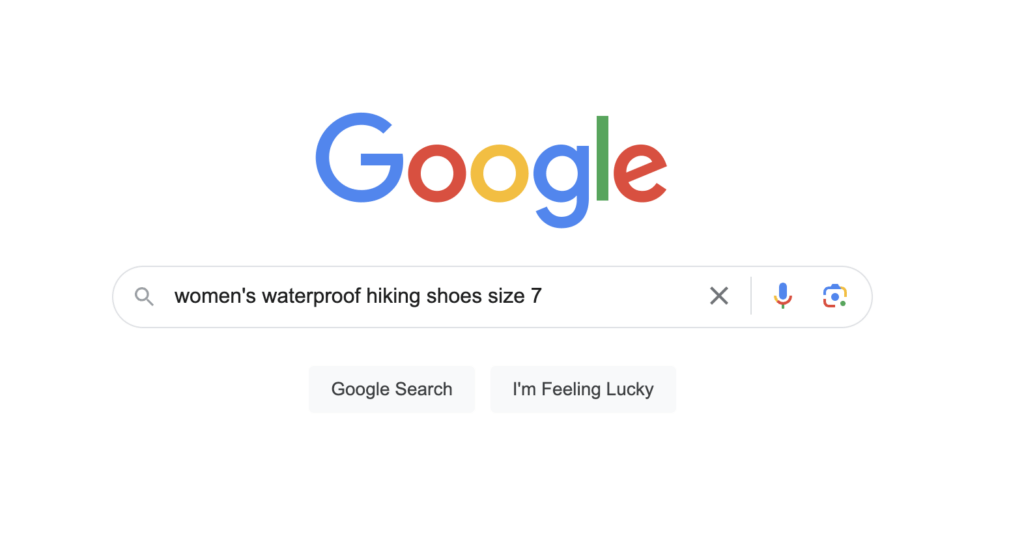
Why Should You Care?
Long-tail searches play a pivotal role in driving targeted traffic to websites.
These keywords are typically less competitive than broader terms. This makes it easier for websites to rank higher in search engine results.
For example, let’s see how many competing pages there are on Google for a long-tail keyword of “tennis shoes for juniors in Finland”:
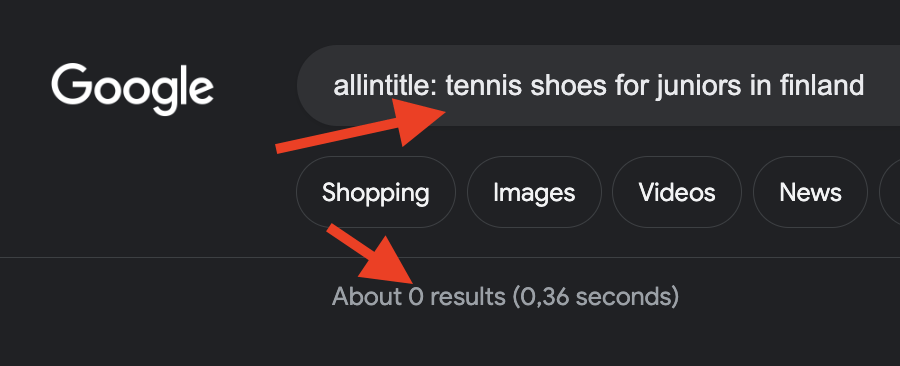
As you can see, there are no results. In other words, there’s no competition and this might be really easy to rank for.
Then, let’s compare it to a short tail search “tennis shoes”:
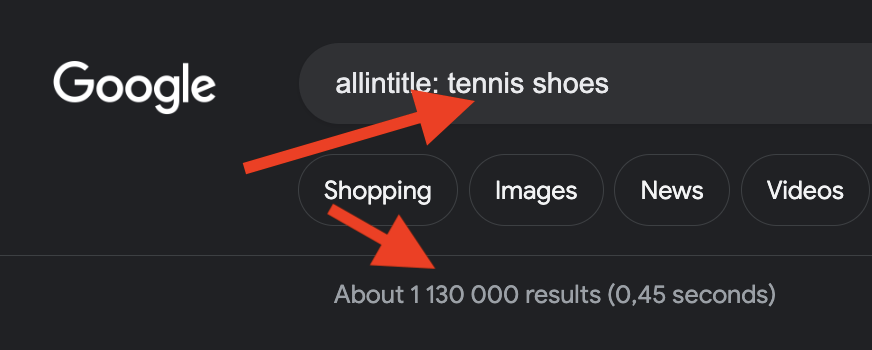
There are 1M+ results. This means there are literally millions of competing pages.
In other words, it’s next to impossible to write a post that ranks for this keyword.
Higher Conversion Rates
If you target commercial or transactional long-tail search queries, you might see a higher conversion rate with long-tail searches.
This is because those visitors are further down the funnel and more likely to convert.

Ok, that sounded way too cool.
In simpler terms, what I meant was that people who search for long-tail searches know exactly what they want.
If you think of a short-tail search like “tennis shoes”, it’s a very broad search with a lot of unknowns, such as:
- Experience level
- Court type
- Color
- Size
And so on.
On the other hand, if someone searches for “Red tennis shoes for mass courts”, that signals that the searcher knows exactly what they want.

In other words, they’re much closer to making a purchase.
1,000 “short-tail” visitors might be much less valuable than 1,000 “long-tail” ones.
Long-Tail vs. Short-Tail Keywords
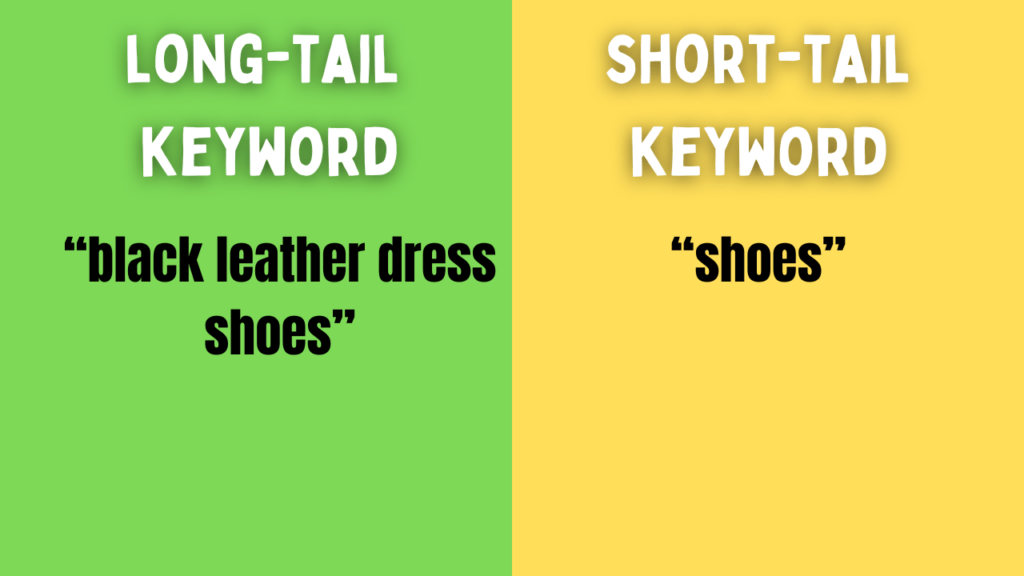
Unlike long-tail keywords, short-tail keywords are broader and usually consist of one or two words only.
For example, “shoes” is a short-tail keyword, whereas “men’s black leather dress shoes” is a long-tail keyword.
The main differences between the two lie in their search volume, competition level, and user intent:
- Search Volume: Short-tail keywords generally have a higher search volume because they’re more generic.
- Competition: Short-tail keywords are (almost always often) very competitive, making it difficult for websites to rank well without significant SEO efforts.
For example, let’s compare the keywords “golf clubs” and “golf clubs for juniors” in Google Trends:
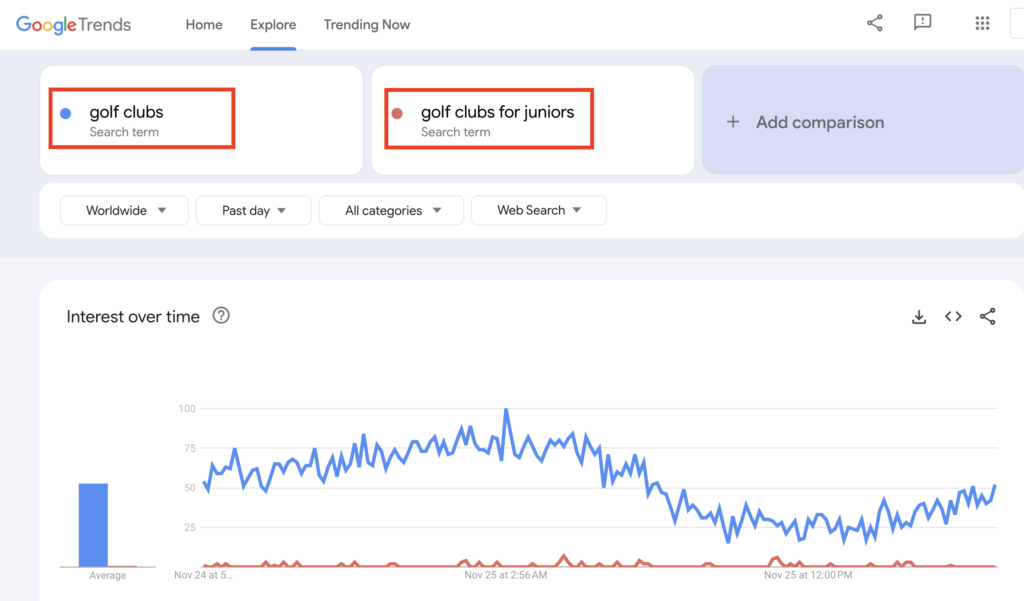
The number of searches for “golf clubs for juniors” is tiny compared to “golf clubs”.
The shorter the keyword, the more searches it has. And the number of searches diminishes fast the more you add words to the tail.
💡 Tip: Don’t use Google Trends to analyze long-tail keywords.
There’s almost never enough data. It can give you the impression that there are no searches even though there were tons.
Identifying Long-Tail Keywords
To find long-tail keywords, just use Google. You don’t need any paid tools for that.
Open up Google and type in something related to your niche and see those autocompletions.
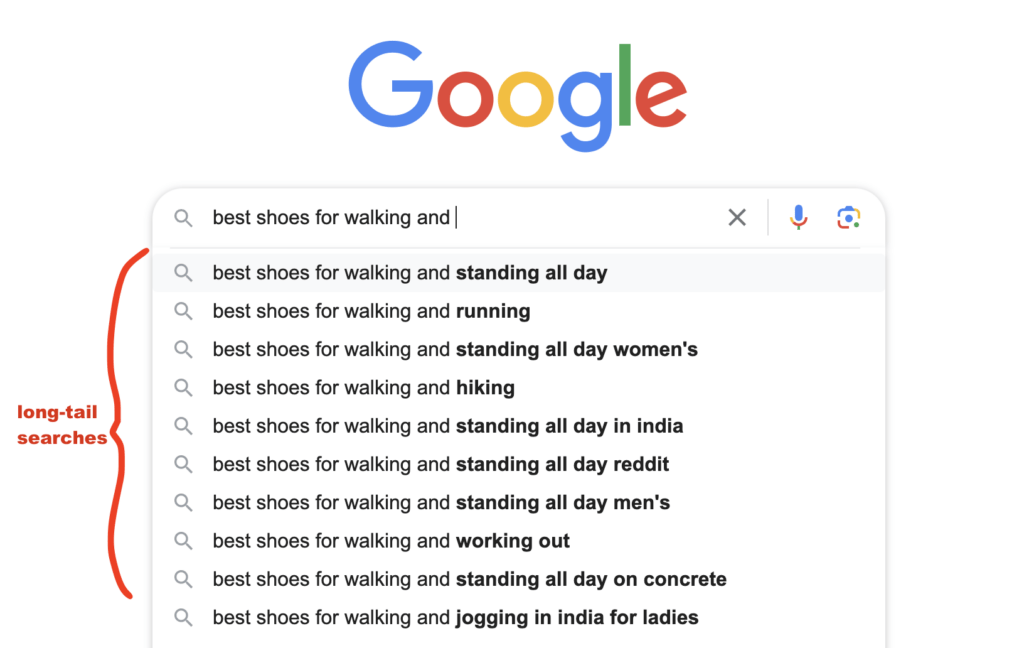
Another way to find great long-tail searches is by using Google’s People Also Ask section.
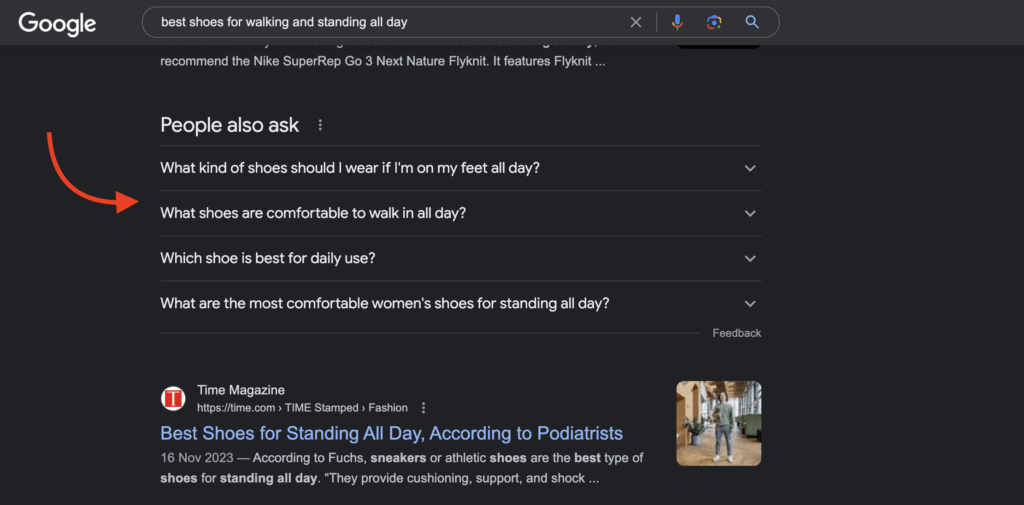
Another great place to find those is by looking at those related searches below the search results.
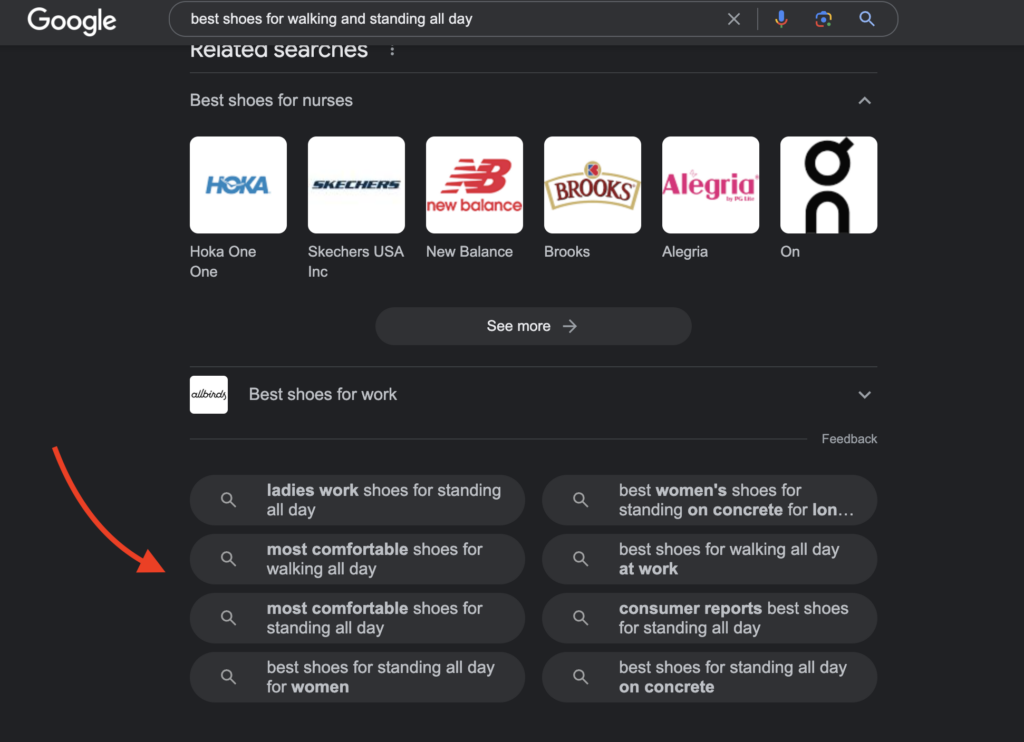
Last but not least, you can always look at what your competitors have written about.
Just open up their sitemap and see what kinds of topics they’ve covered.
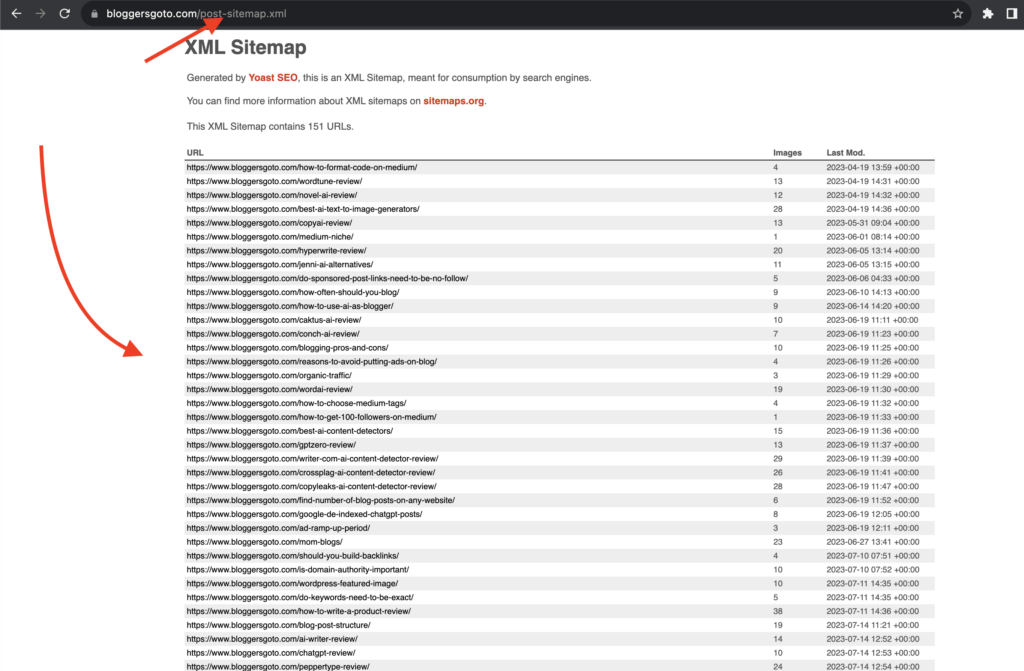
Remember that your success with keywords depends on the competition of your niche.
Usually, keywords of 4-7 words are ones you might have a chance to rank high for.
In some niches, 3-4 word long-tailers might be impossible. But in other niches, those might still be doable.
I have a niche site in Finland in a high competition niche but I still manage to rank for short-tail keywords of 1-3 words in length.
On the other hand, on this blog you’re reading right now, I struggle with even 5-word keywords because of the crazy high competition.
Search Volume
There’s no way to tell how many times a search query gets searched every month.
In my experience, even Google doesn’t seem to have accurate data on that.
That makes those paid tools completely useless. I’ve targeted long-tail searches that seemed to have no searches but managed to get a ton of visitors to those.
Don’t even try to learn how many times a keyword gets searched.
All you should care for is that Google suggests an autocompletion for that keyword. That’s all that really matters.
The “quicker” Google suggests, the more relevant the keyword.
Stop Saying “Keyword”
I dislike the word “keyword”. But I must admit that I still use it all the time because it’s short.
Nonetheless, it makes blogging sound hard and technical.
If you write content for the web, never “optimize for a keyword”. Instead, write a blog post that solves a problem.
That’s all that matters.
Don’t focus on keyword density or keyword placements. That’s only going to land you in trouble with Google.
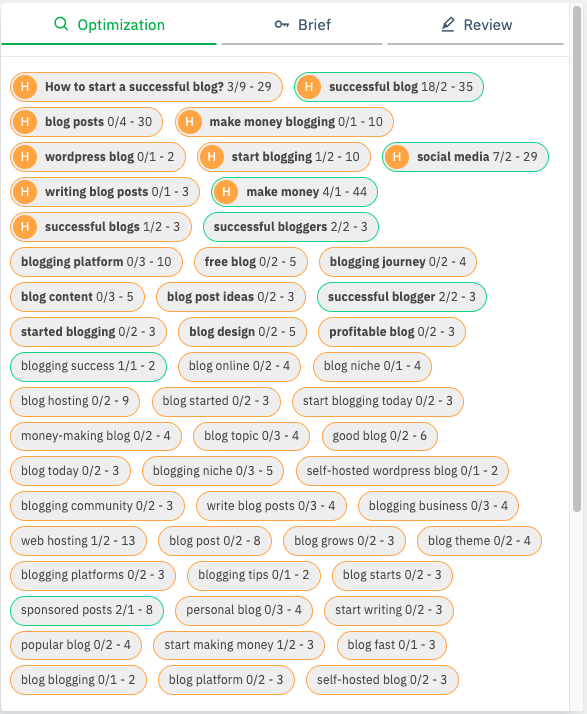
Focus on providing the internet with the best result, be it the long-tail or short-tail keyword you’re talking about.
Don’t Get Stuck with Long-Tails
On my first blog, I only targeted long-tail keywords because those were easy to rank for.
But that’s a mistake.
To rank high on Google, your blog should cover your niche entirely.
Don’t get stuck with long-tail keywords. Instead, write all the blog posts in your niche—not just the ones you have chances to rank for.
Always think about your website in the eyes of people in your niche.
If there’s something that they would expect to be found on your site, make sure to include it. If there’s something that doesn’t really belong there, make sure not to include it.
At the end of the day, you want your blog to be the best resource on the entire internet for that specific niche.
This means everything should be found on your website. Absolutely everything.
Wrap Up
Long-tail keywords are Google searches that have a “long-tail” or many words.
Long-tail keywords offer growth opportunities for new websites. This is because there’s not much competition and options for Google to choose from.
When you start a blog, remember to cover as many long-tail topics as possible. But don’t get stuck.
Eventually, your blog should cover your niche entirely. Not just those long-tail topics.
